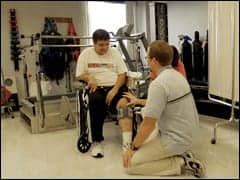Triggering a gene inside astrocytes in the brain may activate them, helping to improve the brain’s ability to heal from various debilitating conditions, such as stroke, concussion, and spinal cord injury, according to researchers.
The study, performed by researchers from UT Southwestern’s O’Donnell Brain Institute, examined spinal injuries, but likely has implications for treating a number of brain conditions through gene therapy targeting astrocytes, says Dr Mark Goldberg, Chairman of Neurology & Neurotherapeutics at UT Southwestern, in a media release.
“We’ve known that astrocytes can help the brain and spinal cord recover from injury, but we didn’t fully understand the trigger that activates these cells,” he says. “Now we’ll be able to look at whether turning on the switch we identified can help in the healing process.”
The LZK gene of astrocytes can be turned on to prompt a recovery response called astrogliosis, in which these star-shaped cells proliferate around injured neurons and form a scar, the researchers suggest in the study, published in Cell Reports.
Scientists deleted the LZK gene in astrocytes of one group of injured mice, which decreased the cells’ injury response and resulted in a larger wound on the spinal cord. They overexpressed the gene in other injured mice, which stimulated the cells’ injury response and resulted in a smaller scar. Overexpressing the gene in uninjured mice also activated the astrocytes, confirming LZK as a trigger for astrogliosis, explains the media release, from UT Southwestern Medical Center.
Goldberg adds that a smaller scar likely aids the healing process by isolating the injured neurons, similar to how isolating a spreading infection can improve recovery.
“But we don’t know under what circumstances this hypothesis is true because until now, we didn’t have an easy way to turn the astrocyte reactivity on and off,” he states.
Further study is needed to analyze whether a compact scar tissue indeed improves recovery and how this process affects the neurons’ ability to reform connections with each other, the release concludes.
[Source(s): UT Southwestern Medical Center, Newswise]




